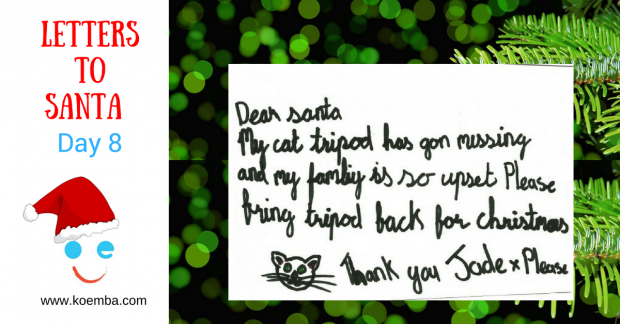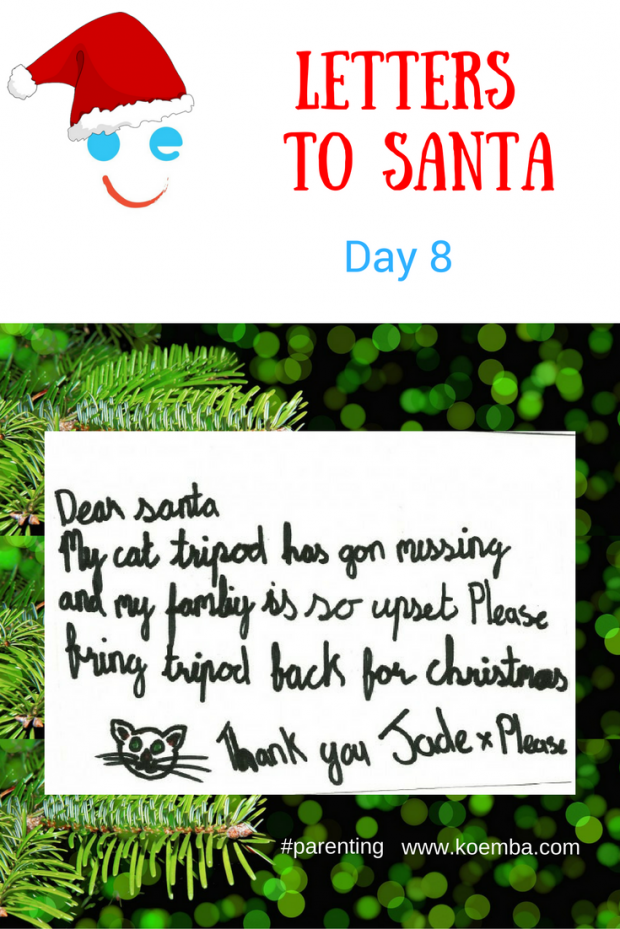
Dear Santa
Remember this letter from a few years ago, when Ireland was covered in snow?
The elves found Jade’s three legged cat, Tripod, and showed her the way home. She’d been lost for SEVEN weeks. The family was so happy to see her again.
But sometimes sad or bad things happen, that we can’t fix.
What would you like parents to know about that, Santa?
PercyPostElf
Dear PercyPostElf
I’m glad you asked, Percy. Christmas isn’t a happy time for many children, or their parents. I imagine it can feel even worse, or more lonely, because everybody else seems happy.
As Parents we want our children to be happy. But I think it’s helpful to realize that we live in a 3D world. And in a 3D world there are shadows. Sadness is the shadow side of love – it’s part of the dimensionality of life. We often want to protect our children from the sad feelings they experience when something feels ‘not okay’.
We often try to jolly our children out of them, or make light of their ‘shadow’ emotions. We use expressions like ‘You’ll be fine,’ (or in Ireland they say ‘You’ll be grand.’) We start talking about something happier. This doesn’t make the sadness go away – it just makes it go underground.
What does help?
Imagine a beautiful Persian carpet. There are dark areas in the pattern. In fact, these add to the richness and beauty of the pattern. It’s like that with the pattern of life.
There are times when we can’t stop the ‘dark patches’ from happening, but we can help our children to make sense of them. Otherwise they stay like tangled knots on the back of the rug. To help our children ‘untangle the knots’, we need to listen to their stories. To be present to what they need to say, we need to PARK our own stuff – our own opinions, our need to make it better. When we PARK we can CONNECT in a way that lets the child tell their own story. When the child is given the space to tell her own story and has it acknowledged, through your listening presence, she is able to untangle the knots and weave it into the fabric of her life.
A very practical book that I’d love to pop into every parent’s Christmas stocking is ‘The Whole Brain Child’ by neuroscientist Daniel J. Siegel and Tina Payne Bryson. A person’s mental well-being does not depend on whether bad things do or don’t happen to people, what makes the difference is whether they weave that into the fabric of their lives.
Parents can learn more about what’s really needed to listen to their children from the Koemba Parent Coaching blog articles. I think they’d especially find ‘Koemba- CONNECT’ helpful.
To Parents who are feeling ‘not okay’ this Christmas, I’d like to encourage them that strong emotions are like waves. They can feel huge and devastating at times but they will pass over. If you are feeling overwhelmed with life at this point, pick up the phone and find help. There are people and organisations who want to be there for you. ‘This too shall pass.’
We let ‘Happy Christmas’ roll off our tongues, but for some people that’s not their reality. I wish we greeted each other with ‘Have a wonder-ful Christmas’, because, even when sad or bad things happen, we can experience the wonder of life in different ways.

Love
Santa
P.S. Tomorrow I’ll be chatting about what to do when families experience conflict.
P.P.S.
Day 1 What to do with Children’s ‘Great Expectations’?
Day 2 ‘Need’ or ‘Want’
Day 3 Dealing with Disappointment
Day 4 Christmas Surprises
Day 5 Three Key Questions Regarding Purchases
Day 6 No Money This Christmas
Day 7 Christmas is for Giving
Day 9 When Grown Ups Fight
Day 10 An Attitude of Gratitude
Day 11 Can’t Forgive
Day 12 Christmas – What Really Matters


No comments yet.